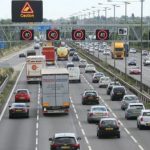Smart motorways come under scrutiny from MPs
MPs in the UK are to investigate both the benefits and safety of smart motorways in a fresh inquiry that will look at how necessary they actually are and whether a rethink is needed.

The Transport Committee inquiry will look at whether safety on smart motorways can be improved, how public confidence can be increased and if a rethink is needed
The investigation by the Transport Committee includes a call for written evidence on smart motorways, following an increasing number of deaths on them and declining public confidence.
Recent media coverage reported 14 fatalities on smart motorways in 2019 compared to 11 deaths in 2018 and five the year before.
Earlier this month, Highways England was referred to the Crown Prosecution Service (CPS) by one coroner for a possible charge of corporate manslaughter following the death of a 62-year-old woman on a stretch of smart motorway.
Smart motorways were also said to “present an ongoing risk of future deaths” in a separate inquest into the deaths of two people on a smart motorway section of the M1 motorway.
The Transport Committee inquiry will look at whether safety on smart motorways can be improved and if there are alternatives to the current ‘all lane running’ type of smart motorway.
A previous review announced by the Department for Transport into smart motorways led to an 18-point package of safety measures, which is currently being rolled out by Highways England and includes abolishing “confusing” dynamic hard shoulder motorways and substantially speeding up the deployment of radar-based Stopped Vehicle Detection (SVD) tech, which can ensure faster detection of broken-down vehicles in live lanes. But the RAC has expressed concerns about the speed with which the updates are being made.
In evidence to the Committee earlier this month, the Secretary of State for Transport Grant Shapps told MPs that he did not want to carry on with the system of smart motorways which he had inherited on coming into office.
Shapps said: “What I commit to is making sure that the motorways we have in this country are safer than the motorways that came before them. That is the commitment I make. To be robust and clear from the evidence of, sadly, how many people die on our motorways, they are the safest form of road, but they should be safer.”
The new inquiry will also explore public confidence in using smart motorways and how it can be improved.
Chair of the Transport Committee, Huw Merriman MP said: “There are genuine worries about this element of the motorway network and we want to investigate how we got to this point.”
The AA said the review was “timely” after coroners, and even police and crime commissioners, had voiced serious safety concerns with smart motorways.
Edmund King, AA president, continued: “For more than a decade the AA has campaigned to improve the safety of smart motorways. Tragically, too many people have died on these roads in the interim.
“Hopefully this inquiry will concentrate minds to stress the urgency of safety improvements.”
The RAC also welcomed the review but expressed concerns about whether the current work on improvements would be able to overcome people’s fears over smart motorways.
RAC head of roads policy Nicholas Lyes added: “If the Government is going to persist with all lane running, it must make sure all schemes – both new and existing – are built and operate to the highest possible safety standards. Crucially, SOS areas need to be more frequent so drivers have a better chance of reaching one in an emergency.
“Whatever happens, it will remain the case that the safety of any driver who comes to a stop in a live smart motorway lane depends both on the lane being closed quickly by Highways England and other drivers then abiding by red X closed lane signs.”
For more details on the Transport Committee’s smart motorway inquiry – and the call for evidence, which is open until 10 April – click here.

